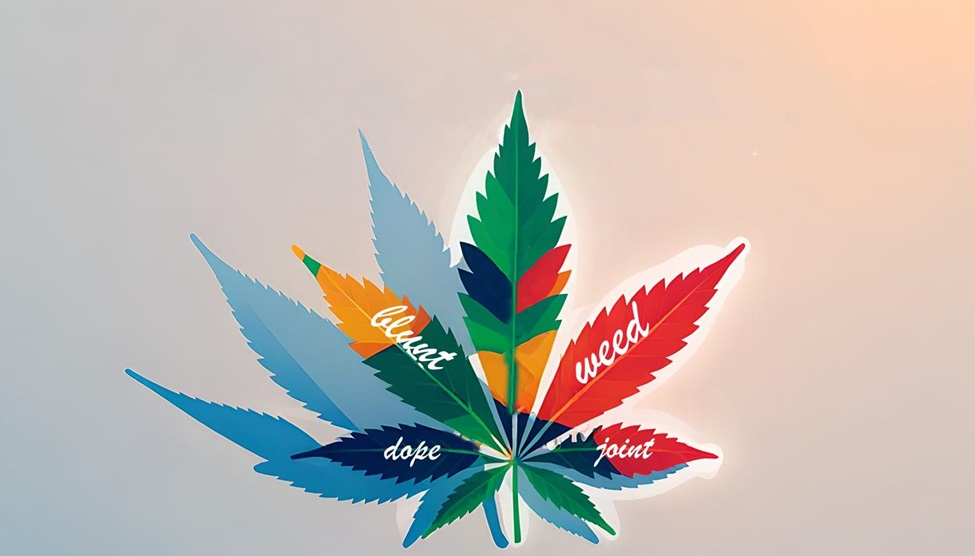Hey there, fellow language enthusiasts! Ever wondered why your local cannabis dispensary sounds like it’s speaking a whole different language? Well, buckle up because we’re about to dive into the wild world of cannabis slang. From old-school terms to cutting-edge lingo, the vocabulary surrounding everyone’s favorite green plant is as diverse as the strains themselves.
Common Slang Terms for Cannabis
Cannabis has a rich vocabulary of slang terms, with over 1,200 nicknames and 2,300 names for individual strains. Let’s dive into some of the most popular ones:
Weed
“Weed” is one of the most commonly used slang terms for cannabis. It’s so widespread that you might see it on banners at cannabis stores or hear it in casual conversations. The term likely refers to the plant’s ability to grow like a weed in various conditions.
Pot
Another widely recognized term, “pot” has been around since the jazz era. It’s often used interchangeably with “weed” and is a quick, easy way to refer to cannabis.
Marijuana
“Marijuana” is an Americanized version of the Mexican Spanish word. Its etymology is complex, with roots tracing back to western Central African languages. The term evolved through Caribbean and South American influences before becoming the familiar “marijuana” we know today.
Ganja
“Ganja” is a term with international appeal. It’s used in English-speaking countries, the Francosphere, and the Hispanosphere. You might even spot “ganja” graffitied on walls in Spain!
Herb
“Herb” is a more subtle reference to cannabis, playing on its plant-like nature. It’s often used by those who want to keep things low-key.
Mary Jane
“Mary Jane” is a playful phonetic twist on the Spanish pronunciation of “marijuana.” This slang term became popular in the 1960s and ’70s during the counterculture movement, where it was often used in music and pop culture to refer to cannabis in a less formal, more personified way. It’s still commonly used today as a casual and lighthearted reference to cannabis.
Reefer
“Reefer” dates back to the early 20th century, often associated with jazz culture and the “Reefer Madness” propaganda film of the 1930s, which aimed to demonize marijuana use. The term refers to a joint or a cigarette containing cannabis. Its use has declined over the years but remains a historical reminder of how cannabis was viewed during earlier decades.
Chronic
“Chronic” is a term popularized in the 1990s, particularly through Dr. Dre’s album The Chronic. It refers to high-quality, potent cannabis, especially strains with a strong effect or high THC content. The term originated from a misinterpretation of the word “hydroponic,” a method of growing cannabis, but it has since become synonymous with top-shelf weed.
Grass
“Grass” is a term that emerged in the mid-20th century, used as a casual reference to cannabis, likely due to the plant’s leafy, green appearance. It was widely adopted during the hippie movement of the 1960s and remains in use as a more laid-back and nostalgic slang term for marijuana.
Wacky Tobacky
“Wacky Tobacky” is a humorous, old-school slang term that refers to cannabis, often emphasizing its mind-altering or “wacky” effects. The term gained popularity in the mid-20th century, particularly among those who wanted to mock or lightly reference marijuana without directly naming it. It’s often used in a playful or ironic way to highlight the psychoactive effects of smoking weed.
Treefer
“Treefer” is a modern slang term that combines “tree” (another casual word for cannabis due to the plant’s leafy appearance) with “reefer.” It’s used to refer to cannabis, particularly joints or buds, and is often seen in more informal settings. The term reflects a blend of old and new cannabis slang, with “tree” itself being a well-known reference in cannabis culture.
Zaza
“Zaza” is a relatively new term, emerging in recent years to describe exotic or high-quality cannabis strains, often with unique flavors or strong effects. It’s used in urban culture and hip-hop communities to refer to premium weed, especially strains that are hard to come by or have an intense aroma and potency. The word has gained popularity through music and social media, where it’s associated with luxury and high-grade cannabis experiences.
Remember, cannabis slang is always evolving. What’s popular today might be outdated tomorrow, so keep your ears open for the next big term in the world of weed!
Slang for Different Cannabis Products
Flower
Cannabis enthusiasts often refer to the dried buds of the plant as “flower” or “bud.” These sticky, crystal-covered beauties are the most traditional form of cannabis. Slang terms like “tree” have popped up, thanks to the plant’s tree-like appearance. The r/Trees subreddit has even popularized this term, leading to some hilarious mix-ups with actual tree enthusiasts!
Concentrates
Concentrates pack a punch with their high THC levels. They go by many names, including “dabs,” “wax,” and “shatter.” Each type has its own unique consistency and appearance. For example, “budder” looks like cake frosting, while “shatter” resembles amber glass. “Dabbing” refers to the act of consuming these potent extracts, often using a special “rig” and “torch.”
Edibles
Cannabis edibles have picked up plenty of slang as they’ve grown in popularity. Terms like “medibles” blend “medical” and “edibles,” often referring to cannabis-infused foods meant for medicinal use. “Space cakes” is a classic, especially for baked goods, while “magic brownies” are probably the most iconic edible out there. Gummies, often called “gums” in the community, are popular too, alongside more playful terms like “pot tarts” (a twist on Pop-Tarts) and “baked goods”, which works as both a nod to the cooking process and the effects of consuming them. Some people refer to particularly potent edibles as “dank treats”, and there’s even “weedies,” a fun mix of “weed” and “edibles.”
Stoner Culture and Lifestyle Slang
420
The number 420 holds a special place in cannabis culture. It originated in the fall of 1971 when a group of high school students in Marin County, California, nicknamed the Waldos, would meet at 4:20 PM to search for hidden cannabis plants. Over time, 420 evolved into a universal symbol for consuming cannabis and celebrating marijuana culture. Today, enthusiasts giggle when the clock strikes 4:20 and try to spot the number everywhere.
Wake and Bake
This term refers to the practice of consuming cannabis shortly after waking up. It’s a popular ritual among some cannabis enthusiasts who believe it sets a positive tone for the day.
Munchies
After smoking weed, many people experience an increased appetite, often referred to as “the munchies.” This phenomenon can lead to intense food cravings and seemingly insatiable hunger. Once you start eating, it’s really hard to stop.
Couch Lock
Ever felt so relaxed after consuming cannabis that you couldn’t move? That’s couch lock. This slang term describes the deep state of relaxation or immobilization that some people experience after using certain strains of cannabis.
Hotboxing
Hotboxing involves filling an enclosed space, like a car or small room, with cannabis smoke. The idea is to create a concentrated environment of smoke, which some believe enhances the high. It’s also called “clam baking” in some circles. While popular, it’s important to note that hotboxing can be intense and may not be suitable for everyone.
Afterthoughts
After diving into the fascinating world of cannabis slang, it’s clear that the language surrounding this plant is far more than just quirky words—it’s a reflection of the culture, history, and evolving social attitudes toward cannabis. Whether it’s the old-school charm of “reefer” or the modern flair of “zaza,” these terms give us insight into how cannabis has been perceived and consumed through the decades. It’s also a reminder that language is always changing, especially in a community as dynamic as this one. As cannabis continues to be embraced worldwide, it’ll be interesting to see how the vocabulary grows and shifts in the future.
Disclaimer: the information provided in this document is for informational purposes only and is not intended as a substitute for professional medical advice, diagnosis, or treatment.

Our Top Brands

5G Pops Product Spotlight







